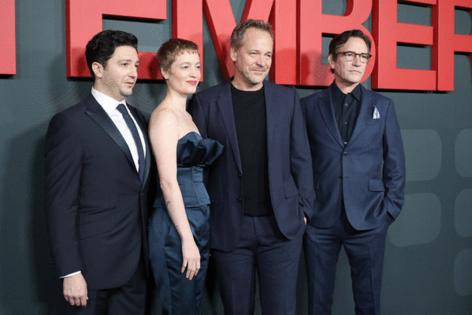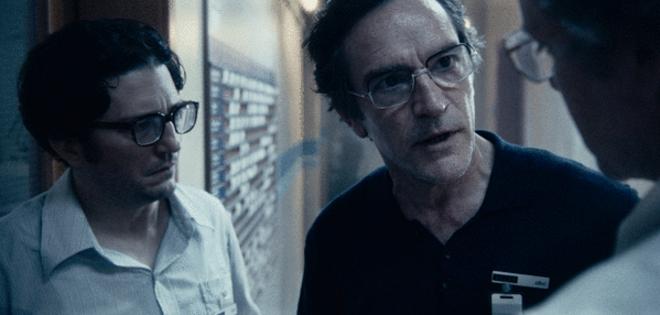On a day when the world woke up to a nightmare in progress, they were in the control room
Published in Entertainment News
The morning of Sept. 5, 1972, began like any other for producer Geoffrey Mason and his ABC Sports team in Munich: another day of capturing the "thrill of victory and the agony of defeat" at the Summer Olympic Games. But as dawn broke, the control room received word that something was terribly wrong.
Details emerged. Members of the Palestinian militant group Black September had taken 11 Israeli athletes hostage, demanding the release of hundreds of prisoners held in their country's jails. Inside the cramped ABC control room, instead of covering athletic triumphs, members of the ABC Sports team suddenly found themselves reporting on a life-or-death crisis playing out in real time a few hundred meters away, as the world watched in horror.
"At one point, the doors of the control room busted open and the German police came in, armed with machine guns, and told us to turn the camera off," Mason, now 84 and the only surviving member of the core ABC team, recalled on a recent afternoon over Zoom from his home in Naples, Florida. "That was a seminal moment because we realized what we were doing was having real impact." Hours later, the situation reached a tragic climax when a failed rescue attempt at a nearby airfield led to the deaths of all the hostages, along with five of the attackers and a West German police officer.
Now, more than 50 years later, the gripping period thriller "September 5" (in theaters Nov. 27) brings these tense moments — the first time a terrorist attack had ever been covered on live TV around the world — back to life. While earlier films like the Oscar-winning 1999 documentary "One Day in September" and Steven Spielberg's 2005 "Munich" have chronicled the events from a broader perspective, director Tim Fehlbaum confines the entire story to the claustrophobic control room, with John Magaro and Peter Sarsgaard heading up the ensemble cast as Mason and ABC Sports president Roone Arledge, respectively, as the ABC team grapples with unprecedented ethical dilemmas and technical hurdles under intense pressure.
"I liked the challenge of telling the story just from that room with the cameras as the only eye to the outside world," says the Swiss-born Fehlbaum, who previously helmed the 2021 sci-fi thriller "Tides." "I would never compare myself with Hitchcock, but it's almost like 'Rear Window.' Ultimately, it became a movie about the power of images."
"September 5," which has earned strong buzz since its back-to-back premieres at the Venice and Telluride film festivals, has only become more timely in the wake of last year's Oct. 7 Hamas terror attacks on Israel that sparked the ongoing war in Gaza. But the film itself steers clear of overt politics, focusing instead on the media's role in covering real-time crises and shaping public perception.
"That [Israeli-Palestinian] situation has been going on since 1948 and, you could argue, for thousands of years before that," says Magaro. "This is a story about the media and our responsibility as citizens in how we consume it. Is showing violence on TV helping us make better decisions as voters? I don't know the answer to that, but maybe the film can open up discussions with people who are in different camps."
Amid escalating conflict in the Middle East and heightened political sensitivities, it remains to be seen how audiences will receive a film that revisits a tragedy that still haunts many today. (Families of the slain Israeli athletes reached a deal in 2022 for $28 million in compensation from the German government, which acknowledged its failures in handling the crisis.) Some might welcome the film's nuanced look at the responsibilities of the media, while others may find it difficult to separate its historical focus from the emotionally charged realities of the current moment.
While "September 5" has assumed new, and not entirely welcome, resonance since Oct. 7, its meticulous production was years in the making. Fehlbaum, who co-wrote the script with Moritz Binder and Alex David, relied heavily on the insights and recollections of Mason, who played a crucial role as a consultant.
"As we began to re-create the story, I would be reminded of things that I hadn't thought of in years," says Mason, who arranged for Fehlbaum and Magaro to spend time in a CBS control room for research. "At the time, there were so many things happening at once out of nowhere, we didn't really have time to think, 'I wonder how we're doing with this?' We knew the trust we had in each other and we knew how to cover events live. We were just doing what we were hired to do: Tell stories not about ice skates or about baseball bats but about human beings."
Shooting in Munich near where the actual events took place, Fehlbaum, inspired by claustrophobic films like Wolfgang Petersen's 1981 submarine drama "Das Boot," sought to maintain an atmosphere of gritty verisimilitude on the set. "A lot of times in period movies, the clothes look pressed and everything is very clean," says Sarsgaard. "We were drenched in sweat the entire time. There was never enough sweat for Tim. The lived-in clothing, the ashtrays — it all creates a physical reality."
In their dedication to authenticity, Fehlbaum and his production team sourced period-accurate equipment from old television stations and collectors, much of it still working, to re-create the analog control-room setup as faithfully as possible. Adding to the documentary-style realism, the film weaves in actual footage from the ABC broadcast that day, to which Mason helped secure the rights shortly before filming began. "I had always said to the producers, 'I'm not going to do the movie if you can't license the footage,'" Fehlbaum says.
As "September 5" was in postproduction, the Oct. 7 attacks reignited the Israeli-Palestinian conflict, adding an unexpected relevance to the film. Though the events it depicts took place more than a half-century ago, Sarsgaard anticipates that some moviegoers will bring their own feelings about the current situation in the Middle East to the theater. "You can't control how people are going to react to things," he says.
"I can't anticipate how the audience will feel about this tragic situation," Fehlbaum says. "On the other hand, the conflict was never solved. It has just tragically escalated again. But we chose to focus on the media's perspective, and the film is a reflection on how we consume these stories."
For Mason, it took time to fully grasp the significance of what his team had accomplished that day. "Whether it was on a mountainside in Innsbruck or in a figure skating hall in Hungary, we knew how to tell stories about people, good and bad, and that's what we did — and as it turns out, we did it well," he says. "Since that day, I have been filled with an immense pride about how well we used the resources we had, under Arledge's guidance, and what positive impact it had on the level of coverage of live events, sports or news, in our industry."
In the immediate aftermath of the tragedy, after nearly 21 hours of nonstop, adrenaline-fueled broadcasting, Mason and his ABC colleague Don Ohlmeyer returned to the Sheraton Munich hotel, where they were staying in adjoining rooms.
"We built ourselves a giant cocktail, sat on the side of the bed and cried like babies," Mason remembers. "It was the first time we were able to touch that emotion. We'd been too busy telling the story to feel it."
©2024 Los Angeles Times. Visit latimes.com. Distributed by Tribune Content Agency, LLC
















Comments